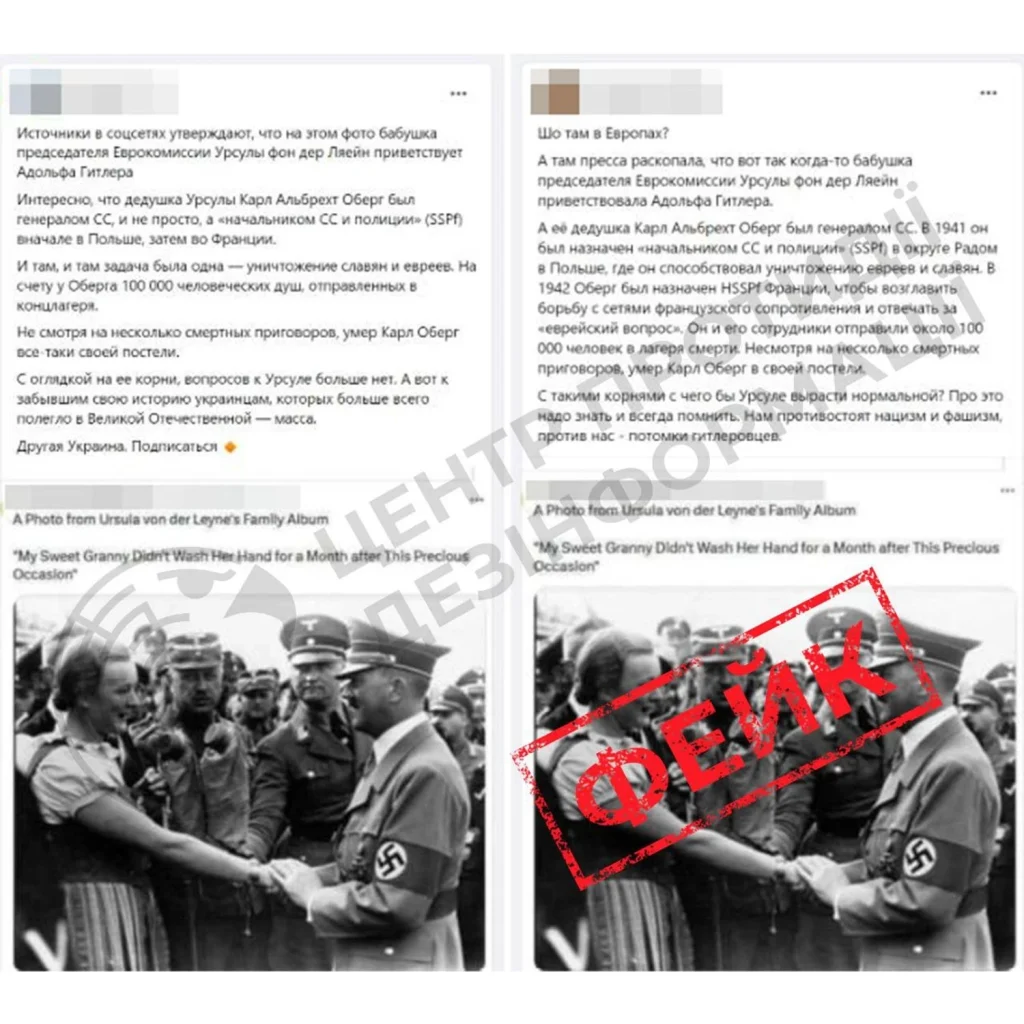Listen to the article
Russian propaganda campaigns have resurfaced targeting European Commission President Ursula von der Leyen with fabricated claims about Nazi ancestry, according to a recent report by the Center for Countering Disinformation. The false narratives aim to undermine her credibility due to her consistent support for Ukraine in the ongoing conflict.
The disinformation operation, identified by Ukrainian monitoring agencies, involves social media posts attributing familial connections between von der Leyen and Nazi officers, specifically Hugo Lauber and Karl Albrecht Oberg. These claims are accompanied by manipulated photo collages and elaborate “occult” narratives designed to create a sense of dark conspiracy around the EC President.
Experts from the Center emphasize that the propaganda relies entirely on name substitutions and doctored images presented without credible sources or historical documentation. After thorough investigation, officials confirmed there is no evidence of any family relationship between von der Leyen and the Nazi figures mentioned in these campaigns.
“This represents a classic Kremlin tactic,” explained a disinformation specialist familiar with the matter. “They select actual historical figures with negative connotations and fabricate genealogical connections to current political leaders they wish to discredit. The goal is to create an emotional response rather than present factual information.”
The timing of this renewed propaganda push coincides with several recent European Commission decisions to strengthen support for Ukraine, including additional military aid packages and the implementation of stricter sanctions against Russia. Analysts note this pattern of intensified disinformation typically follows major policy announcements supporting Kyiv.
According to the Center’s assessment, the primary objective extends beyond personal attacks on von der Leyen herself. “The campaign attempts to tarnish the legitimacy of EU decisions supporting Ukraine by painting supporters of sanctions and aid as ‘heirs of fascism,'” the report states. “This narrative serves the Kremlin’s broader strategy of normalizing hate speech and undermining public trust in European institutions.”
This incident is not isolated but forms part of a systematic effort targeting multiple European politicians. Previous monitoring has identified similar disinformation campaigns alleging “fascist connections” or circulating fabricated scandals about drug use among Western leaders who have taken firm positions against Russian aggression.
Media experts point out that these tactics reflect an evolution in Russia’s information warfare. Rather than creating entirely fictional scenarios, propagandists now frequently incorporate elements of verifiable history, distorted and recontextualized to create more convincing false narratives.
The Center for Countering Disinformation has been tracking these operations since Russia’s full-scale invasion of Ukraine began, noting that the sophistication and frequency of such campaigns have increased as the conflict continues into its third year. Their findings suggest the Kremlin allocates substantial resources to information operations targeting decision-makers who support Ukraine.
Security analysts warn that such disinformation efforts often serve as precursors to more aggressive influence operations. In a related development, the National Security and Defense Council of Ukraine recently exposed Russian attempts to circulate fabricated “peace plans” that exclude Ukrainian participation in negotiations.
As European leaders prepare for upcoming policy discussions regarding additional support measures for Ukraine, security agencies anticipate further waves of targeted disinformation designed to sow division among Western allies and erode public support for continued assistance to Kyiv.
The Center has recommended increased media literacy initiatives and transparent communication from European officials as key countermeasures against these persistent propaganda campaigns.
Fact Checker
Verify the accuracy of this article using The Disinformation Commission analysis and real-time sources.




8 Comments
As the war in Ukraine drags on, it’s clear Russia will continue resorting to underhanded tactics like this to discredit Western leaders. Kudos to the disinformation center for swiftly debunking these false claims.
Agreed, Russia seems intent on sowing division and undermining faith in democratic institutions through coordinated disinformation campaigns. Maintaining a strong, fact-based response is key.
The Kremlin’s persistent use of disinformation is really troubling. Fabricating Nazi ties to smear a European leader is a new low, even for them. We need to stay vigilant against these kinds of propaganda efforts.
Interesting to see Russia’s continued efforts to discredit European leaders through disinformation. Fabricating family ties to Nazis is a low tactic, but not surprising given their past propaganda campaigns.
You’re right, this is a common Kremlin tactic – using doctored images and false narratives to try and undermine political opponents. Glad the disinformation center was able to thoroughly debunk these claims.
It’s concerning how Russia keeps churning out these baseless conspiracy theories, even when there’s no evidence to support them. Undermining the credibility of EU leaders is likely their main goal here.
Absolutely, this is all about sowing doubt and discord, not presenting facts. The disinformation experts are right to call it out as a classic Kremlin tactic.
This is a disappointing but unsurprising development. Russia has a long history of using fabricated narratives to attack its political opponents. Fact-checking and exposing their motives is crucial.